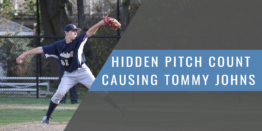| Boost Your Fastball With This Weighted
Baseball Workout |
| By: Bill Bethea
Provided by: STACK
In 1997, I incorporated 4-ounce balls into my throwing program. I threw them a lot, but I had no real rhyme or reason or program. I personally felt they worked, but that was just my opinion. I did gain velocity, but I wasn't sure if the underload training was directly responsible, or my results were a product of the whole workout regimen I was doing. In 2003, theories began popping up that using the underload and overload concept might have some practicality. But there was still a lack of knowledge about how to program this style of training to maximize results and limit stress to the shoulder and elbow. Since then, we have done extensive research with our athletes and found a system that produces great outcomes. We assessed a protocol of throwing 12-, 9-, 5-, 4- and 2-ounce balls, 5 to 10 times each. This order worked well, but it seemed to be effective only for pitchers who lacked strength. Weaker athletes gained velocity, while those who had a base of strength seemed to actually lose velocity. However, the athletes who lost velocity gained it back when lighter balls were introduced to the program. We know that heavier balls recruit more muscle (but with slower arm speeds), and that lighter balls recruit less muscle, making them more dangerous to throw. To gain the benefits of both, it's best to take a hybrid, conservative approach such as detailed in the program below. Weighted Baseball Workout • Throw 4-, 5- and 6-ounce balls 10 times each, twice per week for two weeks. Throw the balls into a screen 15 feet away so the balls don't affect your release point. • Make your throws nice and easy to simply get your arm in shape. • For another two weeks, repeat this program but add more effort to your throws. • For a final week or two, reverse the order, moving from heaviest to the lightest. • At this point, you should measure your results with a radar gun to determine how much effort you're putting into your throws. You will not gain velocity by lobbing a baseball. • Repeat this sequence for 10 to 12 weeks, then switch back to your regular throwing program. If you are new to throwing weighted balls, proceed with caution. Gradually easing into it will ensure results without damaging your shoulder. Do this type of program only in the off-season so you don't fatigue your arm. Once you have experience with this type of training, you can determine if you respond better to lighter or heavier balls. Velocity training for pitchers is not easy, and it is very individualized. There is some trial and error involved. |






